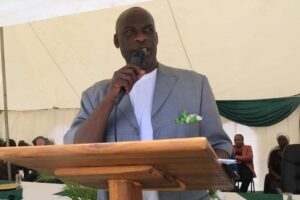
By:Annakleta Haikera
Musese constituency councillor Kosmos Katura says villagers in the Kavango West region are struggling to pay fees for their children to return to school.
Katutura called on community members, school boards and teachers to allow such learners in school because their parents are unable to contribute such funds.
The councillor said this during the commemoration of International Education Day this week, held at Christian Joseph Haihambo Combined School at Kasote village in the Kapako constituency.
His remarks follow reports of some schools turning away learners who are unable to contribute to the school development fund.
“The world has billions of youth who are unemployed and children that drop out of school, because children are denied their right to education as authorities are ejecting learners from schools for non-payment of school development funds,” he fumed.
“Teachers should not compromise the learners’ learning process for simple things such as teachers deciding not to mark a learner’s book because it is not covered. What does an uncovered book have to do with the work that they just have written in the book?” he quipped.
According to him, parents should be allowed to bring their children for admission without being forced to pay any of the school contribution.
“The admission process at schools should play their roles to ensure that all learners get an opportunity to sit in classrooms. There is more space in schools for every child in Namibia.”
Meanwhile, education minister Anna Nghipondoka said the ministry is working on rolling out school governance and social accountability workshops in more regions so that the voices of the learners and school board members are taken into account in the equitable administration of education.
She said this in a speech read on her behalf by the LifeLong Learning, Arts and Culture deputy director Herberth Karapo.
The Namibian National Student Organisation vice chairperson Valentine Kasoma told The Villager that it is important to invest in education, adding that stakeholders should change their mindset and give it all.
“Connect good action with good purpose and make each day count by one child, one book, one pen, one teacher can change the world,” Karapo said.
Elina Kangumbe, a parent at Christian Joseph Haihambo Combined School called on schools to ensure inclusive and equitable quality education and promote lifelong learning opportunities to all.
“Some schools in the region are really full but I would like to call out to the ministry of education to build more schools in the Kavango regions, or rather build tents to avoid learners being sent back home,” he appealed.
The United Nations General Assembly proclaimed 24 January as International Day of Education, in celebration of the role of education for peace and development.
The UN’s position is that without inclusive and equitable quality education and lifelong opportunities for all, countries will not succeed in achieving gender equality and breaking the cycle of poverty that is leaving millions of children, youth and adults behind.
“There is a school of thought that considers the school development fund established by the Education Act 2001 to be equivalent to school fees and thus in violation of Article 20 of the Namibian Constitution and Namibia’s international obligations. These school development funds can be a major obstacle for children from poor households to access schooling and can prevent them from getting out of the poverty trap,” said Toni Hancox, a director at Legal Assistance Centre.









Comments